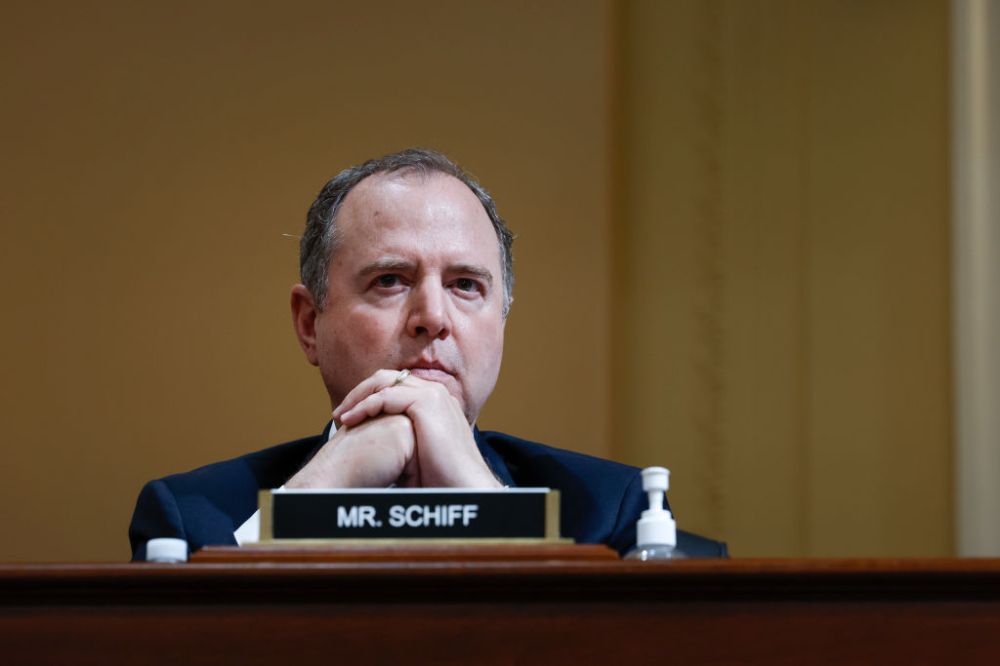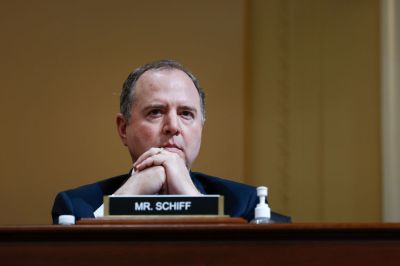Kicking Rep. Adam Schiff off the House Intelligence Committee earlier this year wasn’t enough: Some Republicans want to censure the California Democrat for his involvement in investigations into former President Donald Trump and remarks he made during the House’s 2019 impeachment proceedings.
They argue Schiff misled the American public by claiming there was ample evidence the Trump campaign colluded with Russia to interfere in the 2016 presidential election and that he engaged in “conduct unbecoming” of a member of the House. (You can read the full resolution here.)
The effort initially failed last week, but Rep. Anna Paulina Luna of Florida, a close Trump ally, is set to bring forward a revised measure to censure Schiff this week. She has removed a $16 million fine from the earlier resolution, a move opposed by some Republicans. Rep. Thomas Massie, for example, said he believed the fine was unconstitutional. Without it, he will support the resolution. It’s not clear if the change will be enough to win over all 20 Republicans who opposed censuring Schiff last week, but it might be enough to allow it to pass.
Luna projected confidence the resolution will advance, telling Schiff in front of reporters last week she expects to have the votes to censure him this time around.
If the resolution passes, Schiff would have to go to the well of the House to be formally censured and listen to a reading of the resolution. The measure also calls for the House ethics panel to investigate Schiff’s conduct. A censure is a mostly symbolic form of punishment for members; a more severe course of action is expulsion, which has happened only five times in the House’s history.
Schiff, who is running for Senate, is taking the opportunity to fundraise. In a video after last week’s vote to table the resolution, he said Republicans are trying to intimidate him and “deter anyone who would stand up to Donald Trump.”
“They can bring up a hundred resolutions to censure me,” he added. “I’m not backing down.”
House censures in recent decades have mostly come after members engaged in ethics violations or criminal behavior—although some recent censures and other formal reprimands have focused on speech from members of Congress.
House Democrats in 2021 censured Arizona GOP Rep. Paul Gosar for tweeting an altered anime video that depicted him killing Democratic Rep. Alexandria Ocasio-Cortez. That vote marked the first time a sitting House member had been censured in more than a decade.
Republicans Slam Blinken’s Beijing Visit
The lawmakers most supportive of Secretary of State Antony Blinken’s trip to Beijing over the weekend weren’t shy about their low expectations before the visit.
“It’s a good idea to talk to a competitor-slash-adversary,” Republican Sen. Mitt Romney told The Dispatch last week. “I don’t expect that he’s going to get a lot of truth out of the CCP, but he may get some intel that’s useful to be able to see what they’re peddling around the world.”
The Republicans who were most skeptical of the idea, meanwhile, are disappointed with how the meetings went. They argue it was a disaster, with some describing it as an “apology tour” and an “embarrassment.”
Blinken’s trip primarily focused on reengaging in diplomatic conversations: Communication between the two countries has largely fallen apart in recent years amid Chinese aggression in the Taiwan Strait and its ongoing genocide of mostly Muslim ethnic minorities in the northwest region of Xinjiang. But Blinken walked away from two days of meetings with senior officials and Chinese leader Xi Jinping without a commitment to reopen direct military communications, a change the Biden administration had hoped could avoid escalation during incidents near Taiwan.
Republican lawmakers in the House have slammed Blinken for the trip, demanding to see what kind of retaliatory actions, such as sanctions, the administration may have delayed to pave the way for Blinken’s visit. A Reuters report in May revealed the Biden administration has held back on sanctions responding to the genocide in Xinjiang for months, as officials sought to send Blinken to Beijing.
Republicans are sure to be particularly incensed over Blinken’s remarks signaling the administration wants to move on from the Chinese spy balloon incident earlier this year. “That chapter should be closed,” he told MSNBC on Monday.
“After what they did with the balloon incident and then used that, really, for propaganda purposes, they ought to come here,” Sen. Jim Risch, the top Republican on the Senate Foreign Relations Committee, said of Chinese diplomats last week. “At the very least, they ought to meet at a neutral site.”
“Why they’re chasing China is absolutely beyond me,” Risch added of the Biden administration.
Human rights organizations have also expressed frustration over the trip. Julie Millsap, government relations manager for the Uyghur Human Rights Project, wrote Monday night that the nonprofit advocacy group has had trouble getting meetings with White House officials during Biden’s tenure.
“If you refuse to meet with survivors of the largest mass detention of an ethno-religious group since WWII publicly, what message are you sending?” she asked. She accused the Biden team of prioritizing climate cooperation and trade ties over human rights.
A State Department spokesperson told The Dispatch Tuesday morning that Blinken raised concerns about human rights violations in Xinjiang, Tibet, and Hong Kong, as well as individual cases of abuse. “He emphasized that the United States will always stand up for our values,” the spokesperson added. But the department didn’t answer The Dispatch’s more specific question about how much time Blinken dedicated to discussing the genocide in Xinjiang during his meetings.
The trip will likely see scrutiny from lawmakers in more formal settings. Rep. Mike Gallagher, the chairman of the House select committee on competition with the Chinese Communist Party, told The Dispatch in a recent interview that he wants to hold a hearing with Biden administration officials to examine their China policy. He has been critical of what he calls a “zombie detente” push from the White House, questioning why diplomats would expect better behavior from the Chinese government after decades of engagement have failed.
Democrats, too, don’t quite trust the talks to turn the relationship around.
“It remains to be seen whether the Chinese government really wants to engage deeply or maintain a purely adversarial stance,” said Hawaii Democratic Sen. Brian Schatz. But, he told The Dispatch, “if we only conducted diplomacy with the countries with whom we agreed, it would be a very small list.”
On the Floor
The House is considering several bills related to veterans’ health care and entrepreneurship this week. A full list of measures the chamber may vote on is available here.
The Senate is considering judicial nominees. You can follow floor activity through the week here.
Key Hearings
- Special counsel John Durham will testify before the House Judiciary Committee on Wednesday morning about the FBI’s investigation into the Trump campaign and Russian interference in the 2020 presidential election. Information and livestream here.
- The select subcommittee on the coronavirus pandemic will examine constitutional issues and church closures during a hearing Wednesday morning. Information and livestream here.
- A House Oversight and Accountability panel will meet Wednesday afternoon for a hearing on service delays among federal agencies since the onset of the coronavirus pandemic. Officials from the Social Security Administration, State Department, and National Personnel Records Center are set to appear. Information and livestream here.






Please note that we at The Dispatch hold ourselves, our work, and our commenters to a higher standard than other places on the internet. We welcome comments that foster genuine debate or discussion—including comments critical of us or our work—but responses that include ad hominem attacks on fellow Dispatch members or are intended to stoke fear and anger may be moderated.
With your membership, you only have the ability to comment on The Morning Dispatch articles. Consider upgrading to join the conversation everywhere.